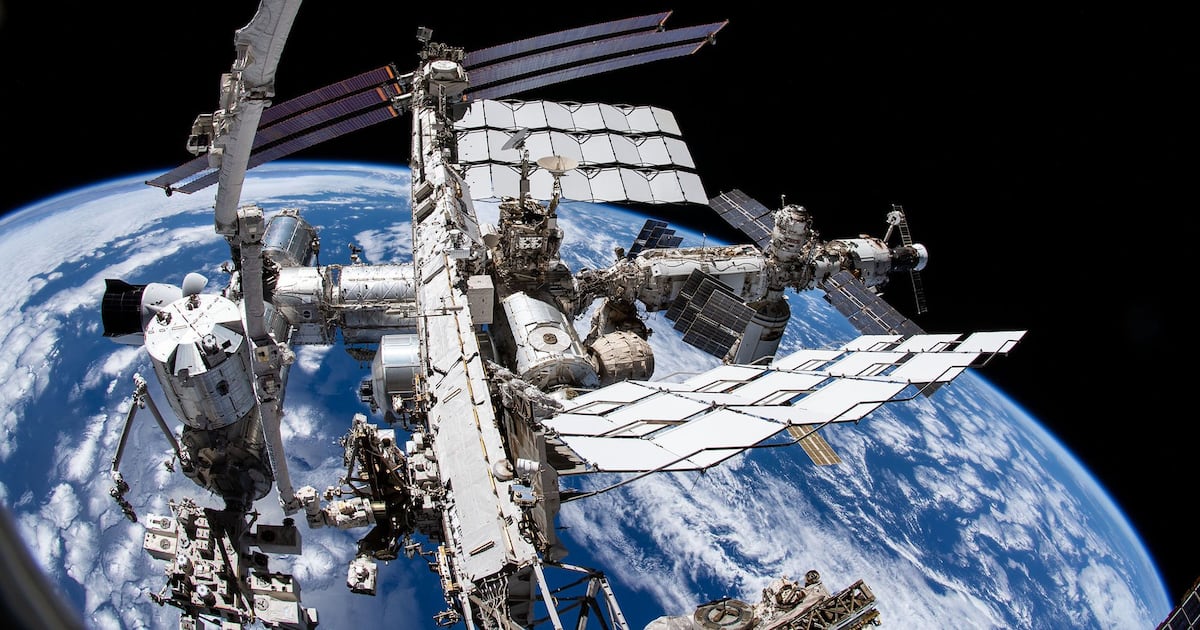Science
Study Reveals Spaceflight Accelerates Aging in Human Stem Cells

Research has unveiled that spaceflight accelerates aging in human stem cells, highlighting the significant impacts of space exploration on human health. A study published in Cell Stem Cell on March 14, 2024, indicates that stem cells, essential for tissue maintenance and repair, lose functionality in microgravity environments.
Lead author Catriona Jamieson, director of the Sanford Stem Cell Institute and professor of medicine at the University of California, San Diego, emphasized the implications for long-term space missions. “In space, stem cells decline in function,” Jamieson stated. “They actually reduce their ability to renew themselves or regenerate.”
The research, partially funded by NASA, was conducted during four resupply missions to the International Space Station by SpaceX from late 2021 to early 2023. This study is notable for being the first to observe stem cell behavior in low Earth orbit in real-time, providing insights into the health management of astronauts.
Monitoring stem cells in space
The investigation focused on bone marrow stem cells from patients undergoing hip replacement surgery. These stem cells, vital for immune and blood health, were placed in sterile bioreactors resembling cell phones. Onboard the International Space Station, an artificial intelligence system continuously monitored the cells.
Jamieson explained that under normal conditions, stem cells should remain inactive 80 percent of the time to retain full functionality. “However, in space, microgravity and cosmic radiation influenced their well-being,” she noted. The stem cells became overly active, leading to functional exhaustion.
Some cells experienced up to 45 days of spaceflight and showed signs of accelerated aging. They activated normally dormant sections of DNA, referred to as the “dark genome,” which are retroviral remnants that constitute approximately 55 percent of human DNA. “Under conditions of stress, we activate these repetitive elements,” Jamieson said, adding that this could push stem cells into a “death spiral.”
Potential implications for cancer treatment
Jamieson, who has participated in nine space missions, plans to conduct further studies to explore countermeasures against the aging process observed in space. She highlighted the potential of using bioreactors to predict which astronauts may cope well in space and which may struggle, suggesting upcoming clinical trials for medications to mitigate the effects of dark genome activity.
Encouragingly, preliminary results from a separate study indicate that stem cells can recover from accelerated aging after astronauts return to Earth, though recovery may take about a year. This research could also provide valuable insights for cancer patients, as their stem cells exhibit similar stress-related damage.
Health risks for astronauts
The findings raise concerns about the health of astronauts during long missions. Arun Sharma, a stem cell biologist and associate professor at Cedars-Sinai Medical Center, noted that weakened blood and immune systems could increase health risks for those in space. He agreed with Jamieson that the study’s results could enhance understanding of the aging process and lead to new therapies.
According to Luis Villa-Diaz, an assistant professor at Oakland University, the research underscores the potential damage microgravity and radiation exposure can inflict on stem cells, emphasizing the health risks associated with extended space travel. “Knowing the potential negative effects that low Earth orbit has on stem cell aging gives us directions to address these issues,” he stated.
Contrasting findings from other studies suggest not all research on stem cells in space points in the same direction. Elena Kozlova, a professor at the University of Uppsala, observed in her work that certain conditions in space might promote a more youthful state in some stem cell populations.
As space exploration continues to advance, understanding the effects of microgravity on human biology will be crucial. The findings from this study not only contribute to astronaut health but may also translate into significant biomedical advancements for patients on Earth.
-

 Education4 months ago
Education4 months agoBrandon University’s Failed $5 Million Project Sparks Oversight Review
-

 Science5 months ago
Science5 months agoMicrosoft Confirms U.S. Law Overrules Canadian Data Sovereignty
-

 Lifestyle4 months ago
Lifestyle4 months agoWinnipeg Celebrates Culinary Creativity During Le Burger Week 2025
-

 Health5 months ago
Health5 months agoMontreal’s Groupe Marcelle Leads Canadian Cosmetic Industry Growth
-

 Science5 months ago
Science5 months agoTech Innovator Amandipp Singh Transforms Hiring for Disabled
-

 Technology5 months ago
Technology5 months agoDragon Ball: Sparking! Zero Launching on Switch and Switch 2 This November
-

 Education5 months ago
Education5 months agoNew SĆIȺNEW̱ SṮEȽIṮḴEȽ Elementary Opens in Langford for 2025/2026 Year
-

 Education5 months ago
Education5 months agoRed River College Launches New Programs to Address Industry Needs
-

 Business4 months ago
Business4 months agoRocket Lab Reports Strong Q2 2025 Revenue Growth and Future Plans
-

 Technology5 months ago
Technology5 months agoGoogle Pixel 10 Pro Fold Specs Unveiled Ahead of Launch
-

 Top Stories4 weeks ago
Top Stories4 weeks agoCanadiens Eye Elias Pettersson: What It Would Cost to Acquire Him
-

 Technology3 months ago
Technology3 months agoDiscord Faces Serious Security Breach Affecting Millions
-

 Education5 months ago
Education5 months agoAlberta Teachers’ Strike: Potential Impacts on Students and Families
-

 Business1 month ago
Business1 month agoEngineAI Unveils T800 Humanoid Robot, Setting New Industry Standards
-

 Business5 months ago
Business5 months agoBNA Brewing to Open New Bowling Alley in Downtown Penticton
-

 Science5 months ago
Science5 months agoChina’s Wukong Spacesuit Sets New Standard for AI in Space
-

 Lifestyle3 months ago
Lifestyle3 months agoCanadian Author Secures Funding to Write Book Without Financial Strain
-

 Business5 months ago
Business5 months agoNew Estimates Reveal ChatGPT-5 Energy Use Could Soar
-

 Business3 months ago
Business3 months agoHydro-Québec Espionage Trial Exposes Internal Oversight Failures
-

 Business5 months ago
Business5 months agoDawson City Residents Rally Around Buy Canadian Movement
-

 Technology5 months ago
Technology5 months agoFuture Entertainment Launches DDoD with Gameplay Trailer Showcase
-

 Top Stories4 months ago
Top Stories4 months agoBlue Jays Shift José Berríos to Bullpen Ahead of Playoffs
-

 Technology5 months ago
Technology5 months agoWorld of Warcraft Players Buzz Over 19-Quest Bee Challenge
-

 Top Stories3 months ago
Top Stories3 months agoPatrik Laine Struggles to Make Impact for Canadiens Early Season










